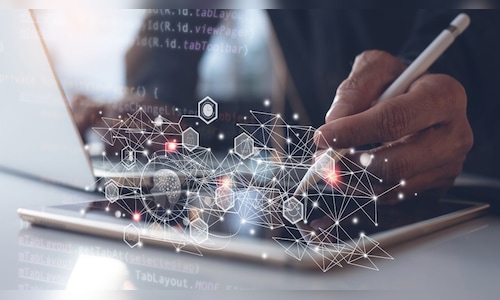In the ever-evolving technological landscape, the future promises transformative advancements that will transform our world in profound ways. Innovation, led by technologies such as artificial intelligence (AI), the Internet of Things (IoT), and quantum computing, has the potential to shape a future that goes beyond what we currently know is possible.
According to Grand View Research, the global AI market is expected to experience a compound annual growth rate (CAGR) of 37.3% from 2023 to 2030, reaching a projected total of $1,811.8 billion by 2030. This marks the beginning of a broader development involving various connected technologies. Statesman IoT, a major player in this scenario, is projected to grow from an annual revenue of $2.7 billion to a whopping $25 billion by 2030. Consequently, quantum computing is gaining prominence and is projected to have a global market value of $4.375 billion by 2028, according to the Markets and Markets report.the.
In 2024, the rapid evolution of technology will shape our world. It is essential to not only observe trends but also harness their potential to generate growth and a better future.
Thriving with technological trends
In the world of technology, a few key trends are shaping our future. One of them is automation, which uses artificial intelligence and robots to change the way we make and move things, from factories to transportation. This quiet force promises more efficiency and is transforming people’s jobs. At the same time, personalization is subtly revolutionizing areas like advertising, healthcare, and education by tailoring experiences to individual preferences.
In this technological landscape, the introduction of 5G technology is a significant advancement. In addition to making our internet faster, it is changing the way we do things like talking to doctors online, using smart devices, and working from different locations. Looking ahead, advances in computing, especially quantum computing, are becoming powerful forces driving advancements in science and applications across various industries.
Pioneering technology in the industries of tomorrow
In the healthcare sector, the integration of robots and artificial intelligence represents a transformative force that changes the way surgeries are performed, diagnoses are made, and new medicines are discovered. To take special care of each patient, personalized treatment plans need to be created. These plans use information about the person’s genes and medical history. To keep this information safe, strong security measures have been implemented.
In the manufacturing sector, the emergence of smart factories represents a paradigm shift. Autonomous machinery and predictive maintenance are redefining supply chains, facilitating real-time data exchange and advanced simulations for product development.
The retail industry is focusing on personalized experiences, where AI acts as a valuable ally, personalizing customer interactions, providing tailored recommendations, and simplifying transactions.
Transportation is undergoing a significant transformation with the integration of AI as Global AI in Transportation Market Projected to Grow from $2.72 Billion in 2022 to $3.25 Billion in 2023The introduction of autonomous vehicles, better traffic management and predictive information are therefore transforming the way people get around. While achieving full autonomy remains a goal, there is no doubt that AI increases safety, improves traffic control, predicts delays, identifies road damage and simplifies parking management.
The next era of technology: understanding the challenges and overcoming them
To navigate the dynamic technology landscape, it is critical to establish adaptable regulatory frameworks to strike a balance between driving innovation and protecting the interests of society. These frameworks must be flexible enough to address the challenges posed by emerging technologies such as artificial intelligence, blockchain, and autonomous vehicles. From debates on vehicle safety standards to evolving regulations on cryptocurrencies, there is a need for proactive adaptation in the regulatory landscape.
In the aftermath of data breaches, it is critical to ensure strong data privacy standards, user consent, and strict personal information protection protocols.
Because of the practical ramifications, ethical standards are needed across all sectors. This includes ethical considerations such as AI bias and transparency. In addition, it is critical to address the significant environmental impact of data centers and e-waste and support programs that promote green technologies, renewable energy sources, and sustainable practices. Furthermore, flexible government regulations are needed to promote innovation while prioritizing people’s health and the environment.
As we look forward to the next wave of technology, it is important to use it responsibly. This requires a joint commitment from individuals, businesses and governments. In our ever-evolving technological environment, prioritising ethical practices, ensuring security and considering environmental impacts are critical to achieving substantial progress.
Today’s best may not be tomorrow’s best in a dynamic environment like ours, so it is essential to adapt and stay informed. Therefore, staying abreast of new technological advances and emerging trends allows us to take advantage of opportunities and make sound decisions, especially now that the renewable energy, data transmission and healthcare sectors will undergo substantial transformation over the next decade.
— Piyush Jha is CEO and Head of India and Asia Pacific at GlobalLogic. The views expressed here are personal.
Disclaimer:
The information contained in this post is for general information purposes only. We make no representations or warranties of any kind, express or implied, about the completeness, accuracy, reliability, suitability or availability with respect to the website or the information, products, services, or related graphics contained on the post for any purpose.
We respect the intellectual property rights of content creators. If you are the owner of any material featured on our website and have concerns about its use, please contact us. We are committed to addressing any copyright issues promptly and will remove any material within 2 days of receiving a request from the rightful owner.

